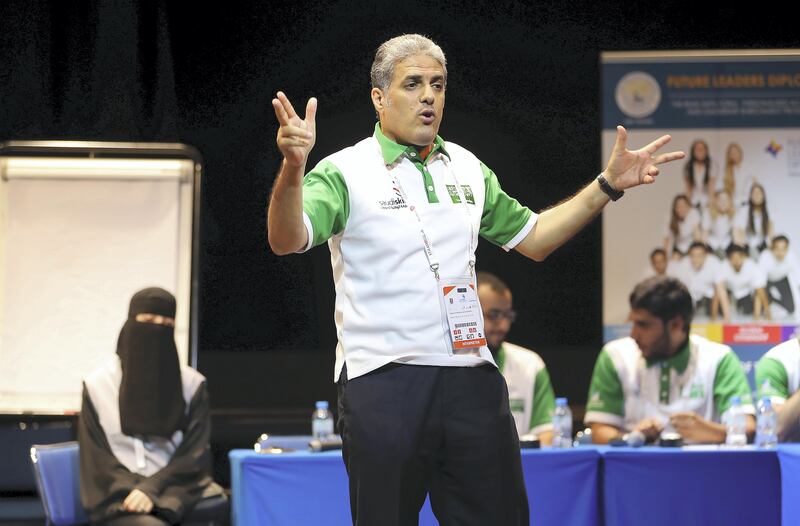When he was a child, Abdulrahman Al Qahtani would ask his cousins what they would be when they were older. The answers were always the same. Engineer. Doctor. Manager. Businessman.
Mr Al Qahtani wanted to do 3-D design and motion design.
His father was unimpressed. “He told me, ‘Ok it is your choice. But if you do and nobody employees you, I won’t employ you either’.”
Mr Al Qahtani chose to keep his family happy and majored in finance, but once he completes his degree next semester he will work as web designer. “The funny thing is, three years later, my father now knows the value of this sector and 3-D design and he asks me, ‘why didn’t you chose to go into that major’?”
Mr Al Qahtani is one of 1,259 participants at WorldSkills Abu Dhabi 2017, which begins on Saturday. In the 44th edition of the event, young professionals will compete in 51 skills including stonemasonry, cabinet making, baking and bricklaying.
On Thursday, competitors visited private and public schools across Abu Dhabi. Each of the 58 competing countries was paired with a different school, where pupils studied the culture and history of the school they hosted.
One School One Country is a WorldSkill tradition to promote cultural exchange but in multicultural Abu Dhabi participants carried another message: vocational training matters.
________________
Read More:
[ How Sheikh Zayed's love of plants proved a winner for one Emirati gardener ]
[ How ancient skills create jewels for the modern woman ]
________________
This may be self-evident. After all, what country can run without its mechanics, carpenters, cooks and computer programmers? Yet in the Gulf, these types of jobs are typically done by foreign labour and often carry a social stigma.
The Saudi team was greeted at the British School Al Khubairat with a reception hall packed with pupils. One performed the cello, another the clarinet.
The Saudi guests explained how vocational training is essential to economic and social development in the Gulf.
“We need these this in our country because all these vocations are done by people from overseas,” said Afra Allayati, 38, a team leader for Saudi’s WorldSkills team and vice dean at the Technical College for Girls in Jeddah.
“Now the government want to develop the country and its independence. People understand it’s very important to work and become knowledgeable in these areas,” she said. “It’s also the need of the country. We need electricians, we need computer engineers, we need tailors. Think about your country and think about how you can give back from your studies.”
Government support for vocational learning has slowly started to change social attitudes, said the Saudi team.
“In in the Gulf region, before it wouldn’t be as acceptable to major in graphic design or web design as majoring in business administration or engineering,” said Mr Al Qahtani, who will represent Saudi in graphic design technology. “They would say you are a mere designer. Now, since the Saudi government started e- government where everything is focused on the web, holding companies have focused on this sector.”
His teammate Khalid Abdulkarim, agreed.
“I think there is a big change happening right now, people start to actually do things they didn’t use before,” said the 21-year-old, who will compete in aircraft maintenance. “They actually start to study these fields and it’s improving now.”
________________
Read more:
[ Thanks to vocational skills, aircraft engineer Maryam Al Kuwaiti's career is really taking off ]
[ Abu Dhabi prepares for tens of thousands of participants and spectators at WorldSkills competition ]
[ Designs that combine culture, Islamic values - and 3D graphic skills ]
________________
A growing number of schools are offering vocational training.
Al Bateen Academy, which was visited by 36 members of the Swiss team, is in the planning and development stage of a vocational curriculum that will start in 2018.
“You have to look at the Abu Dhabi economic vision for 2030 and the competencies and the values that they want learners across the UAE to possess,” said the school principal David Hutson.
“Universities and employers do not just simply want grades and knowledge, they want students to be able to apply their understanding and their skills to real situations. It’s trying to develop an economy and learners with a deep knowledge and understanding of their subject who have the skills that employers seek.”
British School Al Khubairat is in the second year of its vocational training programme.
“The world needs a variety of skills,” said its headmaster Mark Leppard. “People study in different ways and different qualifications offer that. Abu Dhabi is pushing vocational education tremendously and the UAE is pushing it. You have to have a balance.
“My advice to parents when children are choosing their GCSEs or high school exams and a levels is for the children to be able to follow their passion and that way you will genuinely getting them loving what they do.”
The 44th edition of WorldSkills begins on Saturday, October 14. Competitions run at Abu Dhabi National Exhibition Centre from October 15 to 18 and are open to the public.






